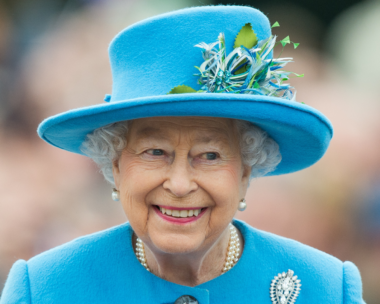The children and grandchildren of deposed King Constantine II of Greece have wealth, beauty, fame and are widely considered the most glamorous of the European royals. But they do not have a kingdom … yet. In our Christmas 2023 edition, The Weekly looked at the fall – and new rise – of the Greek royal family.
There was no official mourning, no gun salute, no slow march through the ancient streets of Athens, but when the coffin of King Constantine II of Greece arrived at the city’s Metropolitan Cathedral on January 16, 2023, it was to large crowds and an extraordinary show of royal solidarity.
Beneath the cathedral’s magnificent Byzantine dome stood a formidable array of crowned heads from around the world, including three kings, six queens, an empress, a tsar, numerous crown princes and princesses, and a grand duke. All had come from their various realms to honour a long-deposed and exiled monarch, now dismissively referred to by the Greek authorities as ‘Mr Constantine Glücksburg’.
Incense and prayer chants filled the air and warm tributes were paid, but it was the closing address of the late king’s heir, Crown Prince Pavlos, 56, that made a nation watching on live TV sit bolt upright: “My dear father,” he declared. “This is not the end.”
It would be tempting to say that the Greek royal family now reigns over nothing more than the covers of glossy magazines. The Prince of Greece, his mega-rich heiress wife, Princess Marie-Chantal and their five photogenic children are familiar sights in the fashionable resorts of the Mediterranean, the Caribbean and the Alps. Their grand homes in London, New York, the English countryside and the Bahamas are cited as a testament to their taste and refinement.
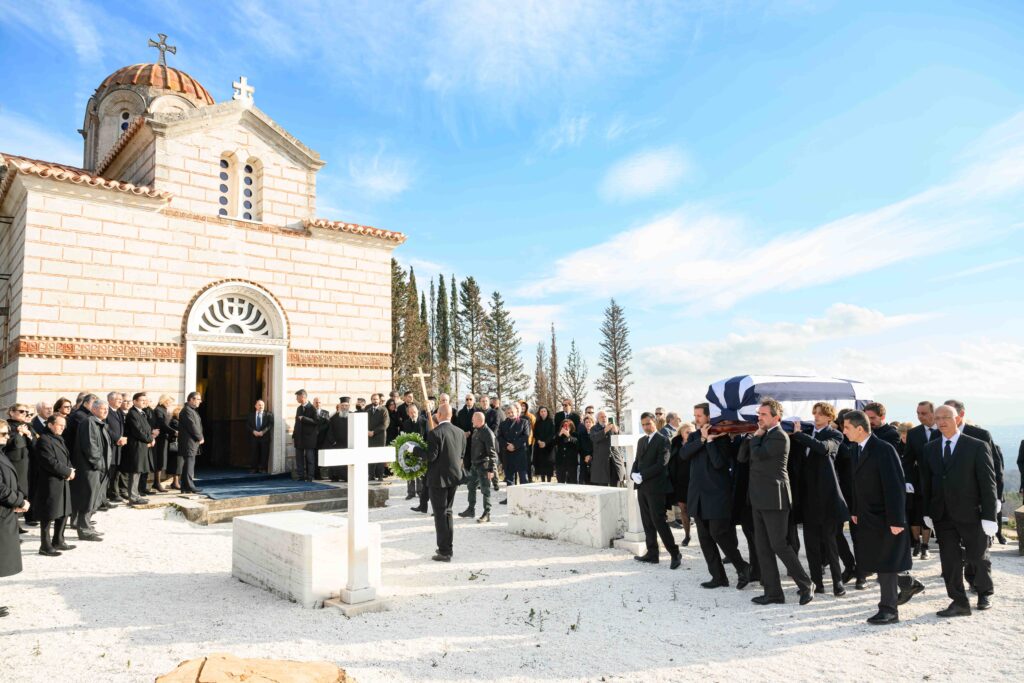
Yet wealth and glamour don’t necessarily compensate for the loss of a kingdom, and the word from Greece’s royalist faithful is that Pavlos and his privileged kin are discretely looking for something more.
Today, with the old royal family scattered, only Constantine’s steadfast widow, Queen Anne-Marie, 76, the younger sister of Queen Margrethe of Denmark, remains in Greece, occupying a modest Athens apartment. (As a tale of two sisters, the super-popular Margrethe and the dispossessed, rarely-seen Anne-Marie could hardly offer a greater contrast.)
But after exactly 50 years as a republic, there is the sense of a changing mood in Greece. The death of 82-year-old Constantine not only brought the royalist flags and anthems back onto the streets, but forced a softening of the official stance against any kind of reconciliation with the monarchy. Having initially announced that the king would be buried as a private citizen, with no state recognition, Prime Minister Kyriakos Mitsotakis backtracked in the face of criticism and sent his deputy to the funeral.
Then, in early March, the prince of Greece dropped another bombshell. He revealed that he and Marie-Chantal were looking for a permanent home in Greece, and in an interview with a French magazine, added: “We want to be more visible to the Greek people. They will be seeing a lot more of us in the future.”
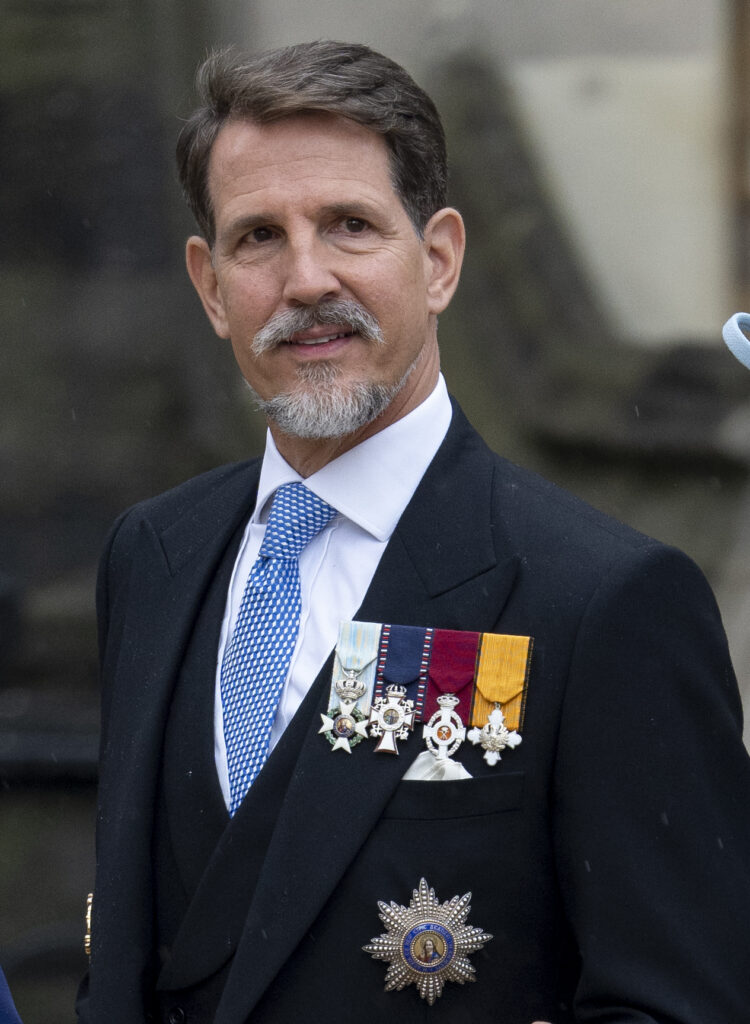
Was the tall, goatee-bearded prince dangling a subtle proposition before his father’s former subjects? If so, despite all the swirl of positive sentiment around the funeral, he will face formidable obstacles.
Pavlos was only seven months old when his father, was forced into exile by the military junta that had seized power in Greece. In a bungled attempt to restore democracy, Constantine launched a counter-coup, which was quickly crushed, and in late 1967, the vengeful ‘Colonels’ drove him out of the country. The royal family fled first to Rome, then to London, where Constantine and his wife, Queen Anne-Marie, were welcomed by Queen Elizabeth and her Greek-born husband Prince Philip. England would remain their home for the next 47 years.
Perhaps unfairly, many Greeks blamed the young, inexperienced king – then only three years into his reign – for failing to resist the junta in the first place, and in 1973, after a one-sided referendum, the monarchy was abolished. All the royal family’s properties, including the historic Tatoi Palace in the hills outside Athens, were confiscated, and their titles scrapped. In what was seen as a calculated slight, Constantine and his family were officially accorded the name ‘Glücksburg’ – a reference to a castle owned by a Danish branch of the family.
Supported by a group of wealthy Greek sympathisers, Constantine, Anne-Marie and their family lived a genteel life in London, moving among the cream of high society, and becoming particularly close to the current King Charles and his then wife, Diana, Princess of Wales. Yet his heart yearned for Greece, and the little prince of Greece was raised with the idea that the old country was his destiny.

Further humiliations were heaped upon the ex-king. In 1993, he was stripped of his citizenship, his passport was cancelled and during a holiday cruise around Greek waters, his yacht was harassed by naval vessels and warplanes. The now stateless king refused to retaliate. His friend, shipping heir and author Taki Theodoracopulous, remembers Constantine forbidding him from criticising the regime on the royal family’s behalf. “He never complained and never accused his enemies,” says Taki.
It wasn’t until ten years ago that Constantine and Anne-Marie were finally allowed to return home. They moved into a grand seaside villa on the Argolis Peninsula, two hours drive from Athens, in an area known as the ‘Hamptons of Greece’. But they had to agree to keeping a low profile, and to desist from engaging in ‘political activity’.
As long as his father was alive, Pavlos, too, felt constrained from doing anything the ever-sensitive Greek authorities might consider provocative. Educated at a private Hellenic school, founded by his father in London, Pavlos later attended Sandhurst, Britain’s elite military training college, and was commissioned as a lieutenant in the Royal Scots Dragoon Guards.
In 1995, having left the army, the prince of Greece married Marie-Chantal Miller, the vivacious daughter of an Anglo-American business tycoon. It was the society wedding of the year, with a virtual Who’s Who of European royalty in attendance. Pavlos later joked to Charles that there were more royals at his marriage to Marie-Chantal than at Charles’ nuptials with Diana at St Paul’s Cathedral.
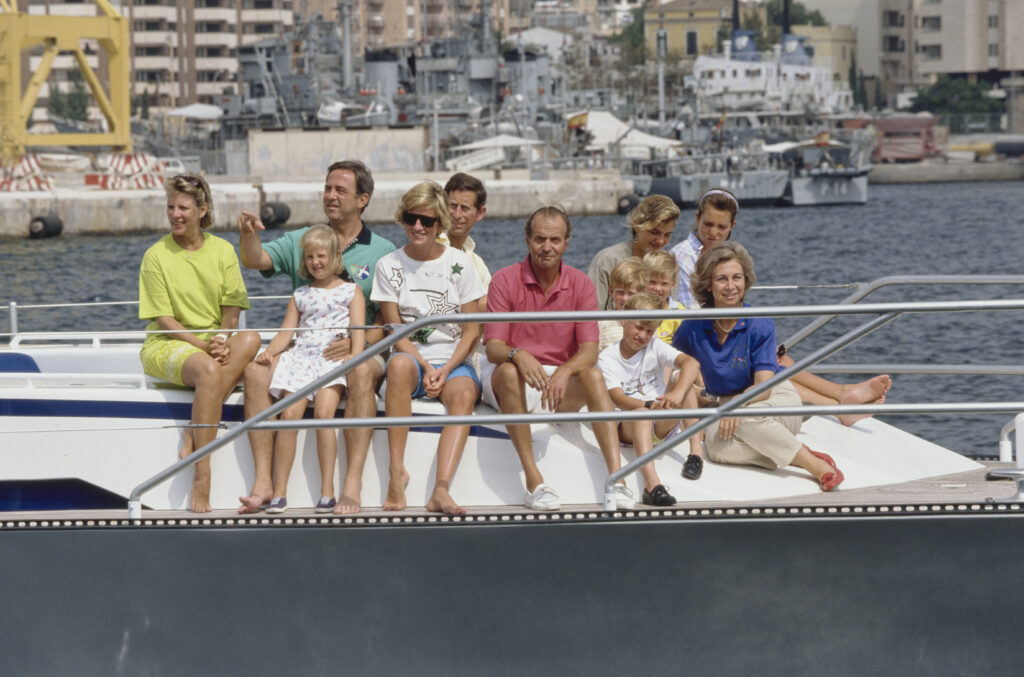
Today the couple and their children divide their time between New York, where Pavlos works as an investment banker, and London, where 54-year-old Marie-Chantal’s luxury childrenswear business is based.
Marie Provost, a writer with the French magazine Point de Vue, which specialises in royal coverage, says: “They are Europe’s most glamorous royal family by far, and they are also very close and hard working and rather nice, too.”
The family powerhouse is undoubtedly Marie-Chantal, whose billionaire father, Bob Warren, owns a global chain of duty-free shops. Raised in Hong Kong, the hub of Bob’s business empire, she was sent to schools in London, Paris and Switzerland, and went on to university in New York, where she moved in bohemian circles, working at one time for pop artist Andy Warhol at his notorious Factory.
It was in New York that the blonde, waif-like ‘factory girl’ met the straight-laced, stiff-mannered, fresh-out-of-the-army Pavlos. They were set up on a blind date by a Greek friend of the prince, who had a hunch that for all their apparent differences they might hit it off.
They did. “We just clicked,” Marie-Chantal said later. “It was love at first sight. I knew he would be the person I would marry.”
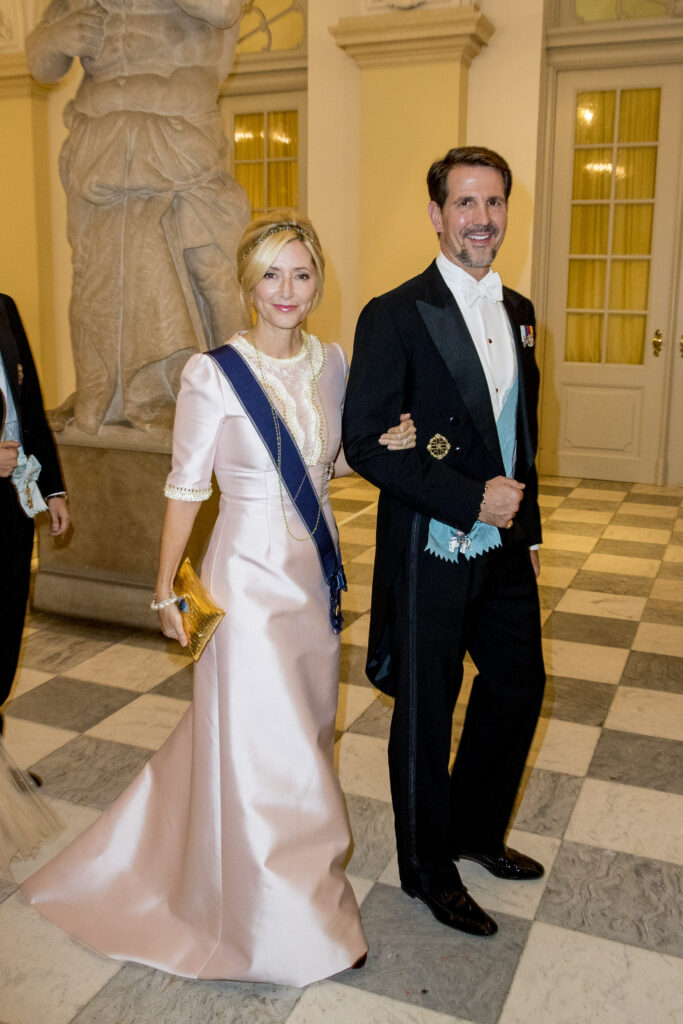
They remained for a while in New York, then in 2002 moved to London, with Pavlos apparently keen for the three children they now had to receive European educations. Their new home, a magnificent double-fronted mansion in Chelsea’s Thames-side Cheyne Walk, quickly became – and remains – a hub of social activity.
A country estate in the Cotswolds – close to King Charles’ Highgrove pile – and a hunting lodge in Yorkshire were soon added to the couple’s UK property portfolio. The couple could afford it. According to the London Sunday Times’ annual Rich List, Marie Chantal alone has a net worth of A$ 4.3 billion.
Not that she has any inclination to join the idle rich. For the last 20 years, the princess has run her own ‘Marie-Chantal’ exclusive babywear and children’s clothing business with a flagship store in London’s Belgravia. She designs many of the items herself, which are often spotted on pampered junior members of the European aristocracy.
“My brand is like my sixth child,” Marie-Chantal told The London Times: “I was a young mother, pregnant with my third child when I started it, and I wanted to work. I’m very creative. I love to draw, and I wanted to do something in the world of luxury or retail because that was what I was exposed to through my father’s business.”

The couple’s three eldest children have been busily blazing their own path through the social scene, with daughter, Marie-Olympia, 27, a goddaughter of King Charles, leading the way. British society magazine Tatler calls her: “The undisputed It girl of London,” and while her modelling career has yet to hit stellar heights, she is prized in the fashion trade as an ambassador for brands such as Dior, Miu Miu and Louis Vuitton. “She’s the life and soul,” says celebrity photographer German Larkin. “She has that sleek, stylish look that every photographer loves.”
Eldest son, Constantine-Alexios, 24, known to his friends as ‘Tino’ and described by royal writer Hilary Rose as “a young, blond Greek god,” has inherited his mother’s artistic bent and is said to be pursuing a career as a sculptor. At least when he isn’t pursuing the upper class girls who flock each summer to the fashionable Greek islands of Mykonos and Patmos, where the holidaying royals like to anchor their yacht. Tino is currently dating society model Poppy Delevingne, 36, who last year split from her businessman husband James Cook.
Then there’s the “fluffy-haired heartthrob” Prince Achileas-Andreas, 23, an aspiring actor known by the stage name ‘Achi Miller’, who has already appeared in an American daytime soap opera. A recent graduate of Manhattan University, Achi has been escorting heiress, Natalie Massenet, daughter of his mother’s best friend Isabella Massenet, founder of the Net-a-Porter fashion company. The two youngest sons, Odysseas-Kimon and Aristidis-Stavros, 15, are both students.
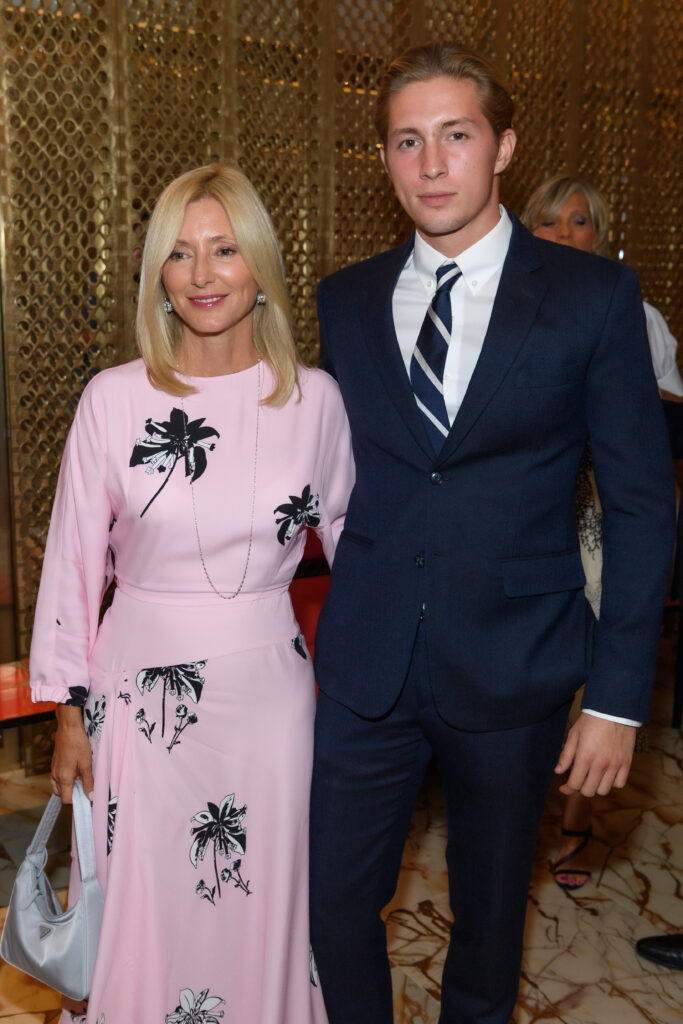
As a royal family with everything except a kingdom, the ‘Golden Greeks’ are biding their time, rebuilding their links with their lost homeland, and not, at least in the short term, expecting too much.
“I don’t think a complete return is likely,” says Andreas Megos, editor of a popular Greek website focusing on the royals. “It’s been too long a time, and most people can’t even remember when we had a monarchy. But those old wounds are healing, and there’s plenty of respect and goodwill towards Pavlos. We saw it on the streets. I think he could definitely play a role here.”
In a similar vein, the prince of Greece insists that he is not seeking to retake the throne. “I’m not looking for anything,” he said. “Our role is to be good people, and do what we can to help the country.”
Yet the signs of reconciliation are everywhere. Despite the political sensitivities, the governing New Democracy party has a substantial monarchist wing, and several of its leading figures are on good terms with the royals. Polls still show a clear majority of voters preferring to remain a republic, but the gap has narrowed in recent years, and as Greece has struggled with chronic economic and social problems, many seem open to the idea of a new constitutional model.

Queen Anne-Marie, a poignant figure at her husband’s funeral, has proved to be a model of dignity and discretion, and is seen by many as the mother of the nation.
‘Exile’ comes from the Greek word for flight, and in ancient times was a common punishment for leaders who were deemed to have failed the people. The good news was that it only lasted for ten years before the slate was wiped clean. Constantine’s exile lasted long enough to pay the debts of five generations, and it may not take that long for his successors to bounce back.

